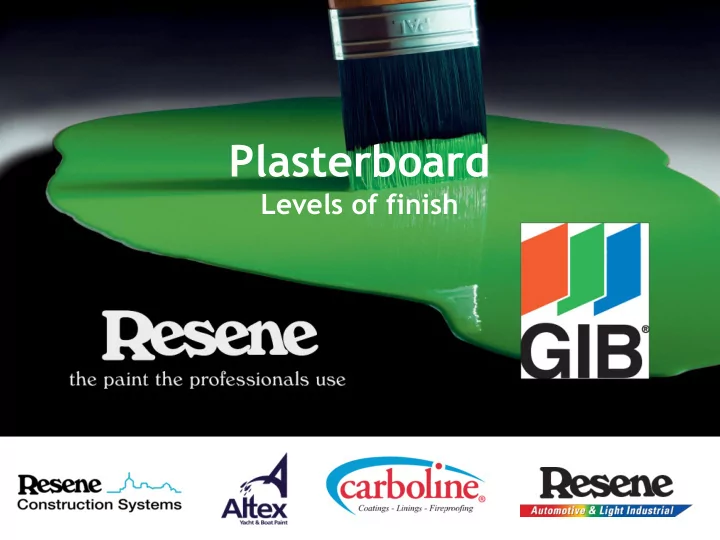

Plasterboard Levels of finish
Information from GIB Site Guide Note: This section is intended as a general platform guide to understanding perceived paint issues only. Please download and refer to the full GIB Site Guide for all information on Residential & Commercial installations. https://www.gib.co.nz/site-guide-and-install /
Introduction Excerpt from GIB Site Guide 2018 1.4.1 Levels of Finish • Having a clear understanding of the Levels of Finish is an important step in delivering an acceptable finished surface. • Levels of Finish are a set of guidelines contained in AS/NZS 2589:2017 for specifying the required quality of finish prior to the application of decorative finishes such as paint Source: Gib Site Guide 2018
Level of Finish relates to the plasterboard surface PRIOR to painting Source: Gib Site Guide 2018
Introduction Three Levels of Finish are defined in AS/NZS 2589:2017. • Level 3 - must be used in areas that do not require decoration, such as above ceiling level or inside service shafts and the like. • Level 4 - shall be the default level of finish for gypsum linings unless specified otherwise. • Level 5 - is for use where gloss or semigloss paints are specified or where critical lighting conditions occur on flat or low sheen paints. (also for Dark colours in both non-critical & critical lighting conditions) Source: Gib Site Guide 2018
Levels of Finish Chart is a simple reference for painting which states Level required based on sheen level, colour selection, and lighting
What is Critical Light? Source: Gib Site Guide 2018 Source: Resene Paints Limited
Example of Critical Light effect- undulating surface
Example of Critical Light effect – Joint peaking
Example of Critical Light effect – Defects Sometimes only appear at certain times of day or with artificial lights on (or off)
Critical Light effect – Paper vs Plaster Paper has a rougher texture, Plaster is smooth Indicative example slide only No actual photo available however it’s very common to see the textural difference between paper & plaster broadcasting through coatings in critical light
Levels of Finish • It’s important to understand the differences in Framing & Installation requirements needed to achieve a Level 5 finish • A skim coat alone does not take Level 4 to Level 5
Guidelines show differences in Framing & Installation tolerance requirements to achieve a Level 5 finish Source: Gib Site Guide 2018
Finishing requirements of Level 5 require a full skim coat Source: Gib Site Guide 2018
Levels of Finish Level 4 Level 5
Note on Surface preparation paint products Excellent for significantly improving surface • condition, equalizing porosity across the board and stopping compounds, and providing the option for a surfacer, sealer & ceiling finish all in one application if required. • Ideal for productivity in Group Housing, Apartment projects etc Important note: They do not improve Level 4 (framing, fixing, • stopping) to a Level 5 finish. The best way to consider them (for L4) is that • they will give you a “Level 4 ½” finish
Assessing the final surface should be undertaken under normal lighting conditions and at normal viewing angles Source: Gib Site Guide 2018
Normal viewing angles when inspecting surfaces as per MBIE Guide to tolerances Source: Gib Site Guide 2018
Plaster compounds need time to dry before you paint Source: Gib Site Guide 2018 Paint applied over plaster compounds not fully dried through can lead to poor adhesion of the sealer or even complete failure of the compounds adhesion
Paint – factors that can DISGUISE surface imperfections • Matt or Low Sheen paints • Application by roller – imparts “orange peel” effect which diffuses light • Lighter colour selections Source: Gib Site Guide 2018
Paint – factors that can ACCENTUATE surface imperfections • Semi-gloss & Gloss paints • Smooth surface finish ie spray application or “smooth finish” roller • Darker colour selections Source: Gib Site Guide 2018
Painting guideline notes – Back Rolling information when spray application undertaken Source: Gib Site Guide 2018
“Back rolling” paint applied by Spray unit imparts an “orange peel” effect which aids in disguising joints and minor surface imperfections. Smooth sprayed surfaces can accentuate imperfections. Source: Gib Site Guide 2018
Main issues we see that are not paint problems Level 4 finish in “Critical Light” environment showing joints as • textural differences (ie paper vs plaster) or undulations/peaking etc – commonly in family/living rooms, hallways or high stud entry areas Dark colours on Level 4 finish showing jointing & imperfections • Smooth finishes which accentuate imperfections and also • cannot be touched up easily
Key Points Level of Finish needs to be considered at Design stage • Be aware of “Critical Light” environments • Colour choice could change your Level of Finish requirements • Work in conjunction with the contractors to ensure everyone is • working to the same requirements A paint finish will not improve Level 4 to Level 5 •
Recommend
More recommend